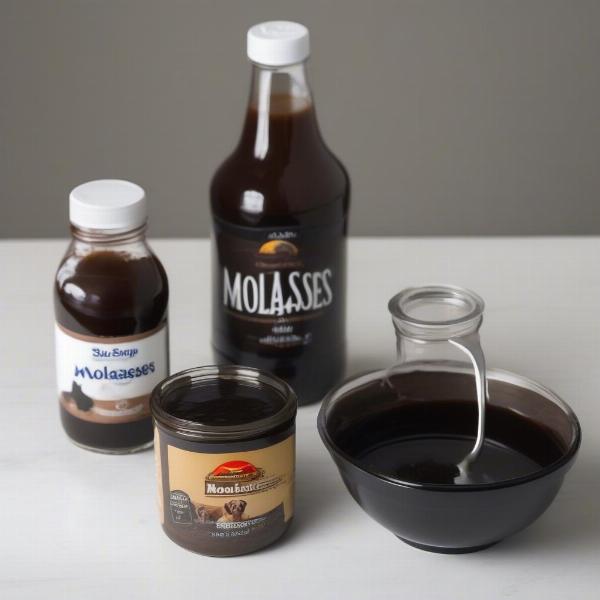Molasses, a thick, sweet syrup, is a byproduct of sugar production. While it might seem like a harmless treat, many dog owners wonder, can dogs eat molasses? The short answer is yes, dogs can eat molasses, but in moderation and with certain precautions. This article will explore the potential benefits and risks of molasses for dogs, along with guidelines for safe consumption and alternative treats.
The Sweet Truth About Molasses and Dogs
Molasses contains various vitamins and minerals, including iron, calcium, potassium, magnesium, and B vitamins. These nutrients can contribute to a dog’s overall health, supporting healthy bones, red blood cell production, and nerve function. However, the high sugar content in molasses poses a significant concern for dogs.
Molasses Benefits for Dogs: A Closer Look
Small amounts of molasses can provide a quick energy boost, which can be beneficial for active dogs or those recovering from illness. The iron content can help prevent anemia, while the B vitamins support healthy skin and coat. However, these benefits can be easily overshadowed by the potential risks if molasses is not given responsibly.
Potential Risks of Molasses for Dogs
The high sugar content in molasses makes it a risky treat for dogs. Excessive sugar intake can lead to weight gain, dental problems, and even diabetes. Furthermore, some dogs may experience digestive upset, such as diarrhea, if they consume too much molasses.
How Much Molasses Can a Dog Eat?
If you choose to give your dog molasses, it should be offered sparingly. A small teaspoon or less is generally considered safe for medium to large-sized dogs. Smaller dogs should receive even less. Always consult your veterinarian before introducing new foods to your dog’s diet, especially if they have pre-existing health conditions like diabetes.
Choosing the Right Molasses for Your Dog
Not all molasses is created equal. Blackstrap molasses, the darkest and most concentrated type, is generally considered the most nutritious option for dogs due to its higher mineral content. However, it’s also the strongest flavor and can be more likely to cause digestive upset. Light molasses, while less nutrient-dense, might be easier on a dog’s stomach. Avoid sulfured molasses, as sulfur can be toxic to dogs.
 Types of molasses
Types of molasses
Safer Alternatives to Molasses for Dogs
While molasses can offer some benefits in small amounts, many healthier and safer treats are available for dogs. Consider offering fruits like apples (without the core and seeds) or bananas in moderation, or dog-specific treats made with natural ingredients. These options provide nutritional value without the risks associated with high sugar content.
Can Puppies Eat Molasses?
Puppies are particularly vulnerable to the negative effects of sugar. It’s best to avoid giving molasses to puppies altogether. Focus on providing them with a balanced diet formulated for their developmental needs. If you have any concerns about your puppy’s nutrition, consult your veterinarian.
What to Do If Your Dog Eats Too Much Molasses
If your dog consumes a large amount of molasses, monitor them closely for signs of digestive upset, such as vomiting or diarrhea. If they exhibit these symptoms, contact your veterinarian immediately. In cases of severe sugar overload, they may require supportive care.
Conclusion
While molasses is not inherently toxic to dogs, it’s crucial to exercise caution and moderation. The high sugar content can pose health risks, and safer, healthier treat options are readily available. Always consult your veterinarian before adding new foods to your dog’s diet to ensure their safety and well-being.
FAQ
- Can dogs eat blackstrap molasses? Yes, blackstrap molasses is generally considered the safest type for dogs due to its higher mineral content, but should be given sparingly.
- Is molasses good for dog anemia? The iron content in molasses can contribute to preventing anemia, but it’s not a substitute for veterinary treatment.
- What are the signs of molasses overdose in dogs? Vomiting, diarrhea, and lethargy can be signs of consuming too much molasses.
- Can I give my diabetic dog molasses? No, molasses should not be given to diabetic dogs due to its high sugar content.
- What are some healthy alternatives to molasses for dogs? Apples, bananas (in moderation), and dog-specific treats made with natural ingredients are healthier alternatives.
- Can molasses help my dog’s constipation? While some anecdotal evidence suggests molasses might help with constipation, it’s best to consult with your veterinarian for appropriate solutions.
- Can I mix molasses with my dog’s food? While you can add a tiny amount, it’s generally better to offer it separately as a very occasional treat, rather than a regular dietary addition.
Related Articles
About ILM Dog
ILM Dog is your trusted international resource for expert dog care and breed information. From choosing the right breed to understanding their nutritional needs, we offer a comprehensive guide to help you navigate every aspect of dog ownership. Whether you’re a seasoned owner or just starting your journey, ILM Dog provides expert advice on health and medical care, training and behavior, grooming and hygiene, product recommendations, and more. Contact us for personalized guidance and discover how we can support your dog’s wellbeing. Email: [email protected] Phone: +44 20-3965-8624.